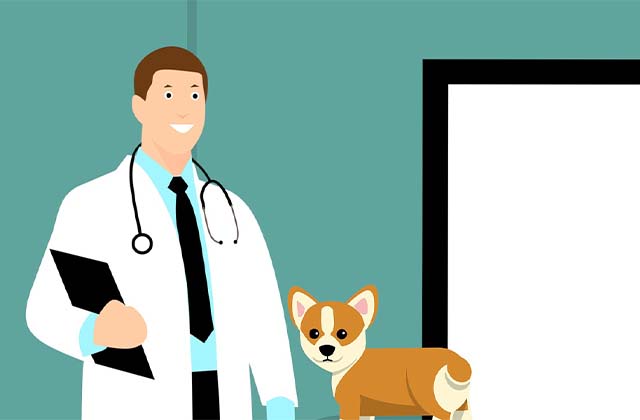
How Often Should I Take My Dog to the Vet? Guide for Caring
As a pet owner, you always want to make sure your furry best friend is healthy. The first course of action when your dog is ill is frequently a visit to the vet. So, how often should I take my dog to the vet?
In order to receive checkups, vaccinations, and other preventative care, healthy adult dogs should typically visit a vet clinic about once a year. Annual checkups are crucial to keep dogs healthy and ward off disease because they age more quickly than humans do.
Table of Contents
How Often Should I Take My Puppy to the Vet?
Two to Three Weeks Old
During your puppy’s first checkup, the vet will:
- Check the puppy’s overall health
- Give the puppy dewormer medication
Six to Eight Weeks Old
Take your puppy back to the vet to receive:
- First vaccinations
- Heartworm medications
- Flea and tick preventative treatments
- Microchip
Up to Six Months Old
Vaccinations for your puppy at 12 and 16 weeks of age may require additional visits to the veterinarian. In addition, the veterinarian might advise scheduling wellness visits for the dog a few times in between vaccinations.

How Often Should I Take My Senior Dog to the Vet?
Older dogs also require routine visits to the vet to maintain their health, just like puppies and younger adult dogs. The majority of dogs should undergo annual blood and urine tests to screen for diseases like diabetes and thyroid disease as well as certain vaccinations that are required every year or two.
Very mature dogs occasionally display behavior that suggests they require an additional vet visit. Consider taking them to the vet if, for instance, they start drinking more water, start peeing more, start losing weight, become confused, startle easily, or exhibit any other unusual changes. These symptoms could be the beginning of diabetes, kidney disease, thyroid disease, heart disease, osteoarthritis, or other illnesses.
How Often Should I Take My Pregnant Dog to the Vet?
First of all, you need to be aware that it’s best to let a female dog go through a few heat cycles before breeding her. She’ll be more physically mature and likely be a better mother to her pups after a few cycles.
The health of the potential mother and offspring as well as the costs associated with breeding responsibly are equally important. You shouldn’t engage in breeding for financial gain or for fun. First, consult a veterinarian.
Schedule a prenatal appointment when you suspect your dog is pregnant. Your veterinarian can help you plan any necessary follow-up appointments as well as give you advice on the best way to meet your dog’s nutritional needs while she is pregnant. Gestation is typically 63 days, and ultrasounds are typically performed at the four-week mark.
What Does the Vet Check During a Physical Examination?
During a physical examination, the vet will check various aspects of your dogs health, such as how much they weigh, how they stand and walk, the condition of their coat, skin and eyes, among other things, says VCA Animal Hospitals.
According to VCA Animal Hospitals, the vet will also check your dog’s mouth and teeth for tartar buildup and examine the heart, lungs, and lymph nodes for any anomalies.
To check for intestinal parasites or eggs, veterinarians may also request samples of your dog’s feces.
The examination of your dog is not all that different from that of you. The veterinarian will make sure that your pet’s health is overall in good shape.
What is the Annual Vet Exam?
Your dog will receive a complete checkup from the vet during annual wellness exams. They will examine their eyes and ears, listen to their heart and lungs, and check for fleas and other common ailments. Additionally, they will update any required vaccinations. Following the examination, the veterinarian might offer advice on your dog’s diet and dental care, as well as suggestions for exercises and medications based on your dog’s current state of health. You’ll have an exhaustive record of your pet’s health over time.
According to the American Association of Animal Hospitals, “pets are more likely to get sick if they don’t visit a veterinarian at least annually.” Being proactive with your dog’s health can help you save money in the long run and keep them healthier for longer.
When to Go to the Vet Right Away
Ideally, your dog will only require annual or semi-annual visits to the vet. But emergencies do happen, and being aware of the warning signs can help you act quickly in those crucial initial seconds.
If your dog shows any of these symptoms, go to the animal ER right away:
- Has been hit by a car or a blunt object falling more than a few feet
- Is unconscious and won’t wake up
- Has stopped breathing, or is having trouble breathing
- Has been vomiting or had diarrhea for more than 24 hours, or is vomiting blood
- You think they may have broken bones
- Is having a seizure
- Has pale gums
- Has ingested something toxic like antifreeze, rat poison, or household cleaners
- Shows signs of extreme pain (whining, shaking, or refusing to socialize)
- Suddenly collapses or can’t stand up
- Is suddenly disoriented
- Has a swollen, hard abdomen
Remember that you are the best person to know your dog. If your dog’s behavior changes unexpectedly, trust your gut and take them to the vet. Additionally, don’t worry about calling the vet too frequently. They want to assist because they are medical professionals.
Which Vaccines Do Dogs Need Every Year?
Your dog can avoid contracting serious illnesses, some of which can be fatal, by receiving routine vaccinations.
For adult dogs, the following vaccines are seen as “core” for most dogs, according to Essentials for pet care, some of which may not need to be provided annually. If you board your dog or enroll it in a doggy daycare, additional vaccinations might be necessary.
- Rabies
- Distemper
- Canine hepatitis
- Canine parvovirus
Conclusion
Here’s a general guide on how often you might visit the vet, based on your pup’s age:
Finding the person who will be responsible for the health and wellbeing of your new furry friend is one of the (many) things to think about as you consider getting a dog.
When you bring the new puppy home, you may also be wondering how frequently you’ll need to take your dog to the vet. The quick answer, presuming your dog is healthy, is: a lot at first, then not so much, then occasionally.




